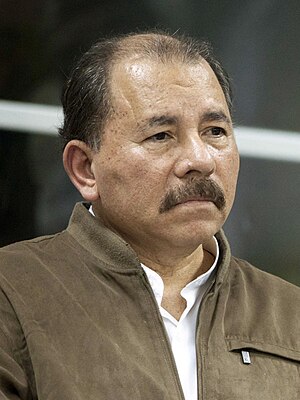Nicaragua
NICARAGUA
Pagina facebook della nazione (Nicaragua)
Gustavo Eduardo Porras Cortés
President of the National Assembly
Asamblea Nacional, MANAGUA
(5052) 276 84 72, 276 84 82
(5052) 228 10 21
forouip@asamblea.gob.ni
National Assembly website
Capi di stato e Ministri
Ultimo aggiornamento: 06/04/2015| Leader | Nominativo | Bio |
|---|---|---|

|
Daniel ORTEGA Saavedra Pres. |
José Daniel Ortega Saavedra (Spanish pronunciation: [daˈnjel oɾˈteɣa]; born November 11, 1945) is a Nicaraguan politician who has been President of Nicaragua since 2007; previously he was leader of Nicaragua from 1979 to 1990, first as Coordinator of the Junta of National Reconstruction (1979–1985) and then as President (1985–1990). A leader in the socialist Sandinista National Liberation Front (Frente Sandinista de Liberación Nacional, FSLN), his policies in government have seen the implementation of leftist reforms across Nicaragua. Born into a working-class family, from an early age Ortega opposed ruling President Anastasio Somoza Debayle, widely recognized as a dictator, and became involved in the underground movement against his regime. Joining the Sandinistas, he also travelled to Cuba to receive training in guerilla warfare from Fidel Castro's Marxist-Leninist government. After the Nicaraguan Revolution resulted in the overthrow and exile of Somoza's government, Ortega became leader of the ruling multipartisan Junta of National Reconstruction. A Marxist-Leninist, his first period in office was characterized by a controversial program of nationalization, land reform, wealth redistribution and literacy programs. Ortega's relationship with the United States was never very cordial, due to U.S. support for Somoza prior to the revolution. Although the U.S. supplied post-revolution Nicaragua with tens of millions of dollars in economic aid, relations broke down when the Sandinistas supplied weapons to leftist El Salvadoran rebels (something which Ortega later admitted occurred). The Reagan administration of the United States funded the opposing rebel groups, known as the Contras, resulting in a vicious civil war. A joint peace proposal by the Democratic Speaker of the House Jim Wright and Ronald Reagan helped precipitate a peace agreement at a meeting of five Central American chiefs of state in July 1987, which won Costa Rican President Oscar Arias the Nobel Peace Prize. It also sparked the wrath of Republicans determined to destroy Jim Wright, despite the fact that it led to free elections in which Ortega was defeated by Violeta Chamorro in the 1990 presidential election, but he remained an important figure in Nicaraguan opposition politics, gradually moderating in his political position from Marxism–Leninism to democratic socialism. He was an unsuccessful candidate for president in 1996 and 2001, before winning the 2006 presidential election. In office, he made alliances with fellow Latin American socialists, such as Venezuelan President Hugo Chávez, and under his leadership, Nicaragua joined the Bolivarian Alliance for the Americas. Daniel ORTEGA Saavedra, Wikipedia |

|
Moises Omar HALLESLEVENS Acevedo Vice Pres. |
Moisés Omar Halleslevens Acevedo (born September 4, 1949) is the current Vice President of Nicaragua, serving during the third term of President Daniel Ortega. Moises Omar HALLESLEVENS Acevedo, Wikipedia |

|
Ariel BUCARDO Rocha Min. of Agriculture & Forestry |
|

|
Martha Elena RUIZ Sevilla Min. of Defense |
|

|
Miriam RAUDEZ Min. of Education, Culture, & Sports |
|

|
Juana ARGENAL Min. of Environment & Natural Resources |
|

|
Marcia RAMIREZ Mercado Min. of Family |
|

|
Ivan ACOSTA Min. of Finance & Public Credit |
|

|
Samuel SANTOS Lopez Min. of Foreign Relations |
Samuel Santos López (born December 13, 1938) is a Nicaraguan politician, currently the Minister of Foreign Affairs, appointed to the post on January 10, 2007. He is also currently a director of the Bolsa de Valores de Nicaragua (Stock Exchange of Nicaragua). Santos Lopez was born in Managua, Nicaragua, to Samuel Santos-Fernandez and Lucila Lopez-Bermudez. He served as mayor of Managua, participating in a debate with New York City Mayor Ed Koch in 1984. He is a member of the Sandinista National Liberation Front, and is involved with a number of businesses and organisations. During his tenure as Minister of Foreign Affairs, Santos López has been involved in a maritime border dispute with Colombia. On 13 April 2010, Santos López was awarded the Order of Friendship by President of South Ossetia Eduard Kokoity, "For a great contribution to the development of friendly relations among the nations, and actively support the independence of South Ossetia, and strengthening its international authority". Nicaragua was one of the first countries to recognize South Ossetian independence. Samuel SANTOS Lopez, Wikipedia |

|
Ana Isabel MORALES Mazon Min. of Govt. |
|

|
Sonia CASTRO Gonzalez Min. of Health |
|

|
Orlando SOLORZANO Delgadillo Min. of Industry, Development, & Commerce |
|

|
Jeannette CHAVEZ Gomez Min. of Labor |
|

|
Mario SALINAS Min. of Tourism |
|

|
Pablo MARTINEZ Min. of Transportation & Infrastructure |
Pablo Martínez (Spanish pronunciation: [ˈpaβlo marˈtines]; born 7 November 1987) is an Argentine actor and singer. His breakthrough came with the role of Simón Rodríguez Arrechavaleta in the Cris Morena Group series Casi Ángeles, for which he also recorded several songs for its official soundtrack albums. Pablo MARTINEZ, Wikipedia |

|
Sec. of the Presidency |
|

|
Hernan ESTRADA Santamaria Attorney Gen. |
|

|
Leonardo Ovidio REYES Ramirez Pres., Central Bank |
|
Alcuni dati statistici della nazione (Nicaragua)
6.134.270 abitanti
41 Abitanti per km^2
Superficie di 130.373 Kmq
Capitale dello stato, Managua
